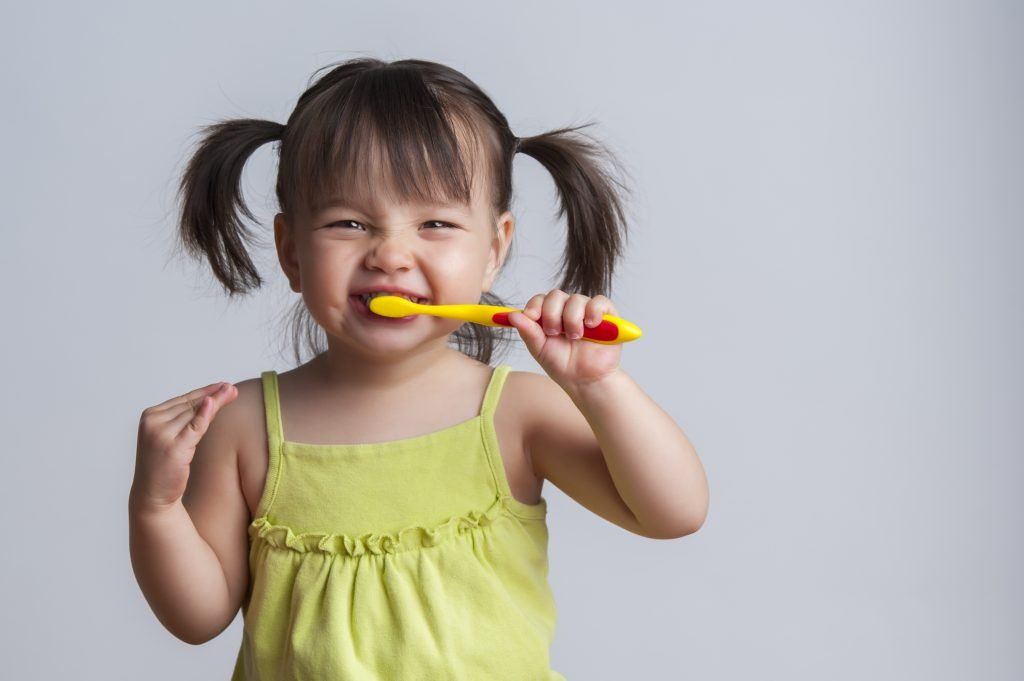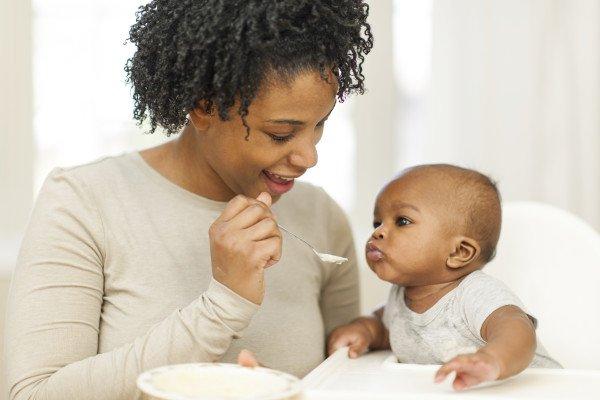Dentists? Brushing? Feeding? What to Expect When Baby’s Teeth Come In
What makes a perfect baby smile? Adorable baby teeth, of course! Here is what to expect when baby’s teeth start coming in.
This new phase of oral development can come with a lot of questions for parents. When can you expect those pearly whites to come in? What do you do if baby is showing signs of discomfort while teething? When do they need to start brushing their teeth and visiting the dentist? Do baby’s feeding habits need to change when they get teeth? We hear your questions and have some answers for you to chew on.

Baby’s first teeth, called their primary teeth, will begin to emerge through their gums around 6-12 months of age.
This process of baby’s primary teeth emerging is called “eruption” (which sounds a lot more painful than it is, although teething may cause some discomfort for you little one!). In all, there will be 20 primary teeth that come in, and the primary teeth will stay in place until your child is around 6 years old.
All of baby’s primary teeth do not come in at once. Eruption is a gradual process. When eruption begins around 6 months (but can happen as late as 12 months), the lower middle teeth will erupt first. These are called the lower central incisors. They are usually followed by the upper central incisors (also known as our “two front teeth”) and the lateral incisors on both top and bottom. Overall, the eruption process may last until your child is nearly 2 and a half to 3 years old (the last teeth to come in usually emerge around 25-33 months).
Check out this chart to learn when you can expect to see baby’s teeth!

Image from the American Dental Association
Eruption can be a bit uncomfortable for baby, a process commonly referred to as “teething.”
But don’t worry, every baby goes through this! Even though teeth are not visible until around 6 months, teething can begin as early as 3 months. Some signs of teething include increased fussiness, biting, loss of appetite or drooling. Check out these tips to keep your baby comfortable during teething.
You can begin “brushing” baby’s mouth before their teeth come in.
Even if they don’t have those pearly whites just yet, baby’s mouth could still use a little clean-up every day. You can use a cloth to wipe their gums at least once a day beginning at birth, to get them used to the feeling and routine of teeth bushing. This also promotes increased tongue movement, which can help with their feeding skills.
Once their teeth emerge, the real brushing begins.
Just like children and adults, it’s recommended that baby’s teeth are brushed twice a day with fluoride toothpaste. Baby will not use a regular toothbrush, because their mouth and teeth are too small! Instead, use a baby-sized toothbrush and a small dab of fluoridated toothpaste (no bigger than a grain of rice). There are even baby toothbrushes that fit on your finger, which can make the tiny brush easier to control.

It’s best for the second brushing to be after they’ve stopped feeding for the day. Even substances like milk can lead to tooth issues if it sits in baby’s teeth all night. You can also continue to wipe down baby’s gums with a cloth once a day.
It’s also important to incorporate fluoride into your child’s diet when they get their first teeth.
You’ve probably heard a lot about fluoride, but what is it exactly and why is it so helpful for our teeth? Fluoride is a mineral that supports development of bones and teeth. It strengthens enamel (the protective coating on the outside of our teeth) and helps to prevent cavities.
So where can you find fluoride? First of all, baby’s toothpaste should always include fluoride. Additionally, fluoride is added to the tap water in most major cities, but it’s best to check if your town adds fluoride to the water (in the U.S., many states and cities provide this information to the CDC, where is it publicly accessible). If you do not have access to water with fluoride added, you can ask a healthcare provider like a dentist if they recommend another source of fluoride for your little one.
Speaking of the dentist: Baby’s first dental appointment should happen by their first birthday.

The AAP recommends children visit the dentist after their first tooth has erupted and by their first birthday. Even if they haven’t had any teeth erupt by their first birthday, it’s a good idea to take them to the dentist. If baby isn’t a big fan of the dentist, here are some ways to make the appointment more enjoyable!
When baby’s teeth start coming in, some parents wonder if this will change their feeding abilities.
Because it takes a while for baby’s teeth to come in, changes in baby’s feeding will be gradual, not immediate. Their feeding progress is also more dependent on their motor development, rather than how many teeth they have. So having teeth may eventually help your child safely chew more foods, but while their teeth are just emerging, continue to give them foods that they can safely eat. The teeth that help with chewing and mashing harder foods come in last, so even if baby has some teeth, they are not ready for these types of foods. Check out our feeding checklist to learn about the best foods for baby’s age. Remember to talk to a healthcare provider before starting baby on solid foods.

Breastfeeding or bottle feeding should still continue through at least the first year of baby’s life.
Some breastfeeding mothers are concerned about biting after teeth come in, but there are simple ways to prevent this! If biting does occur, it is typically at the end of feeding. If baby is old enough, they can be taught not to bite by saying “no” in a matter-of-fact tone when a bite is attempted. Mothers can also use a finger to break the suction once baby has stopped sucking, to prevent biting.
The arrival of baby’s primary teeth is an encouraging sign of development, and will help with their future feeding and communication skills. So say cheese and have baby show off those beautiful new teeth!





